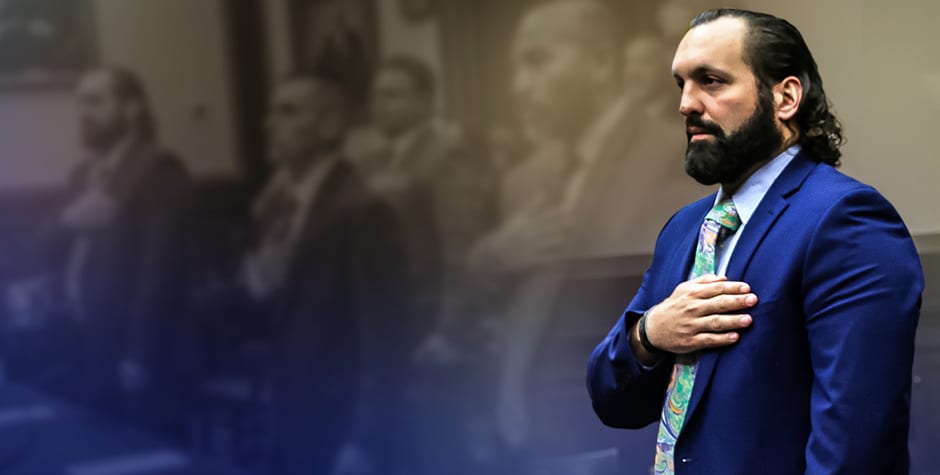ACLJ Files Major Brief Defending FBI Whistleblower Garret O’Boyle in Federal Appeals Court
Brave FBI whistleblowers are putting their careers on the line to expose the Deep State’s corruption. If not for brave heroes like FBI Special Agent Garret O’Boyle, we wouldn’t know about the Biden Administration’s unconstitutional targeting of Christians and pro-life advocates. But O’Boyle is paying a steep price for raising the alarm about this government targeting and corruption, which is why the ACLJ is defending him.
A month ago, we shared a positive update at the United States Court of Appeals for the D.C. Circuit, where the court decided not to dismiss O’Boyle’s case based on the FBI’s motion to dismiss but to allow it to be heard by a panel of judges instead. With our case able to proceed, we just filed our merits brief at the D.C. Circuit in defense of our client.
Because O’Boyle blew the whistle on the Biden Deep State’s schemes, the FBI suspended his security clearance. This resulted in O’Boyle being suspended without pay, barred from taking any other employment, and shuttled into administrative limbo – still a federal employee but unable to work or receive pay.
Agent O’Boyle has attempted to challenge his suspension through the intricate legal system in place for government employees, called the Merit Systems Protection Board (MSPB), but he has been stymied at every turn. He has now been without pay for over a year and has been forbidden from finding employment elsewhere.
In our appeal, we argue that when O’Boyle appealed his suspension to the MSPB, he should have been able to argue that he was suspended for whistleblowing. The FBI did not argue that it hadn’t engaged in reprisal against our client; instead, it responded by arguing that courts do not even have jurisdiction to decide whether our client was retaliated against.
There are two legal issues here. First, and most importantly, the administrative judge decided that he was ostensibly prevented by antiquated jurisprudence (Dep’t of the Navy v. Egan, 484 U.S. 518, 530-31 (1988)) – which, unfortunately, is still on the books – from looking at the actual underlying reason O’Boyle’s clearance was suspended in the first place, i.e., whether the suspension was unlawful retaliation by the FBI for whistleblowing. The judge ruled that the court could not even consider whether the security clearance was suspended because of O’Boyle’s whistleblowing activity. Such a ruling could allow for limitless retaliation against federal employees for doing the right thing, completely undermining whistleblower statutes in their entirety.
In response, the ACLJ is arguing that Egan’s precedent should not include constitutional cases like our client’s. Security clearances should not be able to be suspended in an act of whistleblower retaliation without any external review. Such a rule renders the FBI free to target its employees for any reason, however discriminatory.
If the court agrees that the Egan decision bars even constitutional claims like our client’s, we intend to seek review at the U.S. Supreme Court. Denying any and all relief for whistleblower federal agents would be unconstitutional.
The second legal issue is that a case from a different appeals court, the Federal Circuit, held that FBI employees (when they appeal an employment decision to the MSPB) can never argue that an employment decision was made as an act of whistleblower retaliation. According to this decision, FBI employees cannot argue that they were suspended for an improper reason when they appeal their suspensions.
Under this system, the FBI is both the defendant and judge of the employee’s whistleblower claim of unfair treatment, with no external checks or balances. We have argued that the D.C. Circuit should not follow this decision based on basic principles of due process. FBI employees should not be denied the basic opportunity to hold the FBI accountable for whistleblower reprisal.
Although the legal issues are complicated in this case, the ultimate issue is simple. As we said in our brief: “The FBI’s retaliation against whistleblowers is not immunized from judicial review. The First Amendment protects the right of government employees to report wrongdoing. When they are retaliated against for doing so, they possess a right to pursue accountability for that retaliation in court.” In other words, FBI employees should not be denied their day in court when they are retaliated against for bringing information to Congress about how the FBI has been weaponized and abused.
The ACLJ will never stop fighting to protect brave heroes who are putting their livelihoods on the line to shine a light on Deep State corruption. Stand with us as we stand with FBI Special Agent Garret O’Boyle.
